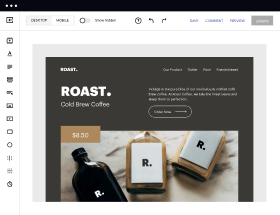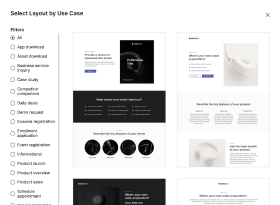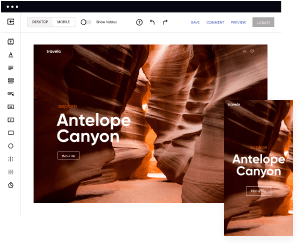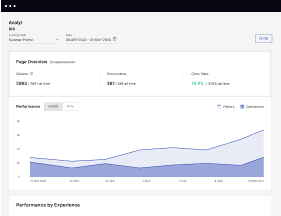Take your seller page creation experience to the next level with our WooCommerce-compatible template
Build and integrate high-converting seller page templates with WooCommerce effortlessly!

Easy to build without coding
With the intuitive drag-and-drop builder, anyone on your team can create high-converting pages without any knowledge of code or design. Make enhancements to your landing page with custom widgets using Javascript, HTML/CSS, or third-party scripts.
Multiple layouts for any industry and goal
Select from 500+ landing page layouts built to boost conversions across industry-specific scenarios. Customize them by adjusting fonts, adding images, and generating on-brand content with the AI assistant. Quickly scale with Instablocks® and Global Blocks that you can save, reuse, and update globally.
Loads fast and looks polished on any device
Every template is responsive, which means they present professionally on any device and load blazingly fast with our Thor Render Engine. You can also power them up with Google AMP technology to deliver an unparalleled mobile experience and drive higher conversions.
Robust analytics & experimentation
Get real-time updates and reporting across all your devices, showing the number of visitors, conversions, cost-per-visitor, and cost-per-lead. Launch AI-powered experiments, run A/B tests, and use heatmaps to analyze user behavior, then optimize your landing page to maximize conversions.
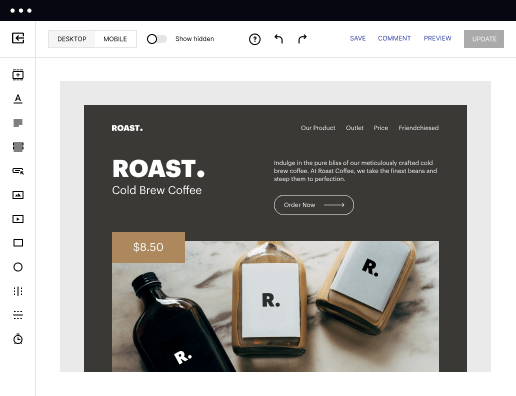
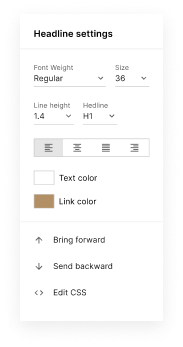
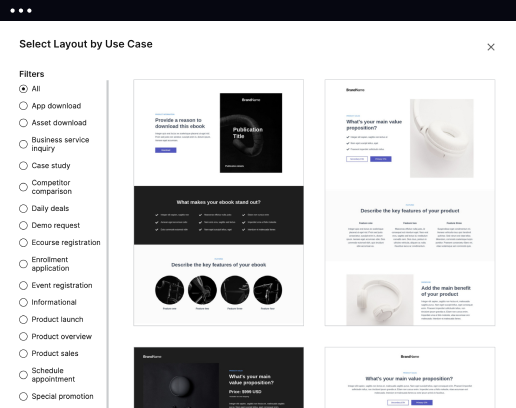
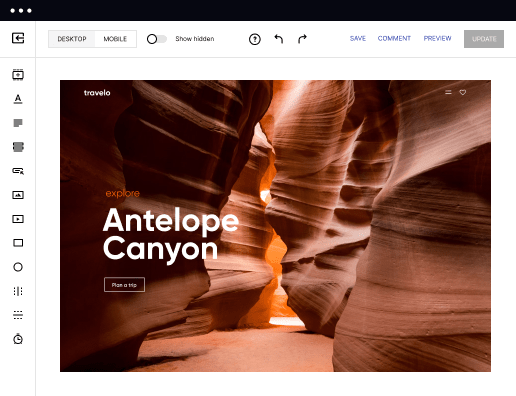

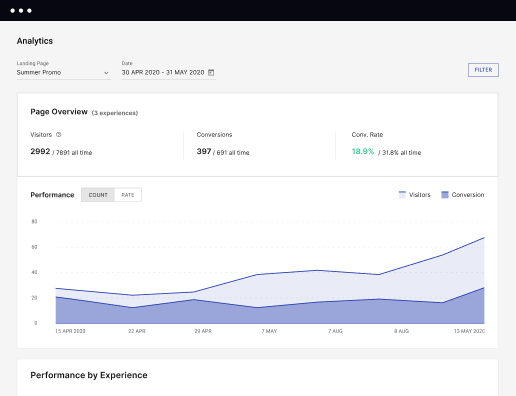
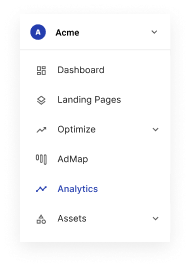
Easy to build without coding
With the intuitive drag-and-drop builder, anyone on your team can create high-converting pages without any knowledge of code or design. Make enhancements to your landing page with custom widgets using Javascript, HTML/CSS, or third-party scripts.
Multiple layouts for any industry and goal
Select from 500+ landing page layouts built to boost conversions across industry-specific scenarios. Customize them by adjusting fonts, adding images, and generating on-brand content with the AI assistant. Quickly scale with Instablocks® and Global Blocks that you can save, reuse, and update globally.
Loads fast and looks polished on any device
Every template is responsive, which means they present professionally on any device and load blazingly fast with our Thor Render Engine. You can also power them up with Google AMP technology to deliver an unparalleled mobile experience and drive higher conversions.
Robust analytics & experimentation
Get real-time updates and reporting across all your devices, showing the number of visitors, conversions, cost-per-visitor, and cost-per-lead. Launch AI-powered experiments, run A/B tests, and use heatmaps to analyze user behavior, then optimize your landing page to maximize conversions.
All the features you need to build lead-generating landing pages
Explore more featuresLearn how to build top-performing landing pages for any goal
FAQs
Leading the way in building high-performing landing pages





A powerful guide to maximizing conversions with Instapage
To maximize the effectiveness of your digital marketing efforts, Instapage stands out as the leading landing page and conversion rate optimization (CRO) platform. Its comprehensive approach provides marketers with the necessary tools to enhance, scale, and significantly improve your campaign's ROI, making it essential for businesses across various sectors in the USA.
Understanding the importance of landing page optimization
Optimizing your landing pages is crucial for driving conversions and capturing leads effectively. A well-designed landing page not only attracts visitors but also guides them toward completing desired actions. Instapage allows marketers from diverse industries such as education, financial services, and government to create high-converting pages without needing extensive coding knowledge, fostering an engaging user experience.
- User-friendly interface: Instapage’s platform is designed to be accessible, allowing users to create landing pages with drag-and-drop simplicity, which is vital for busy marketing teams.
- High-converting templates: Accessing over 100 ready-to-use templates helps accelerate page creation and ensures adherence to optimal conversion practices.
- Real-time collaboration: Streamlining feedback and edits among team members speeds up production, ensuring that campaigns launch on time.
Step 1: Create your landing page with Instapage
Start by selecting a template that aligns with your campaign objectives. The intuitive page builder makes it easy to customize these templates to suit your brand's visual identity and messaging.
Step 2: Optimize with built-in experimentation features
Once your landing page is live, utilize Instapage’s robust optimization tools. Conduct A/B testing to compare different versions of your page, ensuring you identify which elements resonate best with your audience.
- Heatmaps: Analyze on-page behavior with heatmaps that indicate where users click and scroll, helping you understand how to better direct their journey.
- Advanced analytics: Instapage’s analytics dashboard provides clear metrics on performance, allowing you to make data-driven decisions for campaign improvement.
- Dynamic text replacement: This feature helps tailor content to specific audiences based on the source of their traffic, thus increasing relevance and conversion rates.
Step 3: Personalize the user experience
Engaging users is about more than just the design; it’s about delivering content that speaks to their unique needs. Tailor landing pages through dynamic text replacement and targeted ads using AdMaps, ensuring users encounter relevant experiences.
- Audience segmentation: Use intuitive tools to segment your audience and tailor messages effectively, driving higher engagement.
- Performance tracking: Utilize audience-level metrics to assess how different segments interact with your content, allowing for targeted improvements.
- Immediate adaptation: Respond to audience insights quickly by adjusting landing page content to better align with evolving consumer demands.
By leveraging these strategies through Instapage, marketers can enhance their digital campaigns, ensuring higher conversion rates and effective ROI.
Ready to elevate your marketing strategy? Start leveraging Instapage’s powerful platform today and transform your digital presence.
People also ask about Seller page template compatible with WooCommerce
Understanding WooCommerce seller page templates: A gateway to enhanced online selling
The evolution of e-commerce: The role of seller page templates
The e-commerce landscape has undergone significant transformation over the past two decades. According to recent statistics, online retail sales have surged, accounting for over 20% of total retail sales globally. This growth has underscored the importance of having an engaging seller page, which acts as a digital storefront, welcoming customers and showcasing products in an appealing manner.
As consumers increasingly turn to online shopping, sellers must adapt to meet the expectations of the digital marketplace. An engaging seller page not only enhances user experience but also becomes a critical element in converting visits into sales.
Comparing different e-commerce platforms
When evaluating various e-commerce platforms, it's essential to consider their strengths and weaknesses. Major players like Shopify, Magento, and WooCommerce each offer unique features tailored to different business needs. Shopify, for instance, is known for its ease of use and simplicity in setup but has limitations in customization. In contrast, WooCommerce shines in its adaptability, offering robust options for customization and scalability, making it ideal for businesses looking to grow.
Exploring the WooCommerce seller page template
A seller page template in WooCommerce serves as a foundational structure for online sellers. Its primary purpose is to create a visually appealing and functional space for showcasing products. Typical components include product images, descriptions, pricing, reviews, and calls-to-action, each carefully arranged to guide the user towards making a purchase.
WooCommerce provides several default features within its seller page templates. These include pre-set layouts that are designed for user-friendliness and built-in functionalities such as product galleries and filters. Sellers can select from various themes tailored to different industries, ensuring their page aligns with their branding.
Pre-set layouts that enhance the shopping experience
Flexible product display options, including grids and lists
Integrated review and rating systems for increased trust
Moreover, WooCommerce templates can be customized to fit specific brand identities. Users have access to a variety of tools for modifying aesthetics, including color schemes, fonts, and overall layouts. For more advanced changes, coding skills or the use of specific plugins can further enhance the template's functionality.
Key benefits of using seller page templates with WooCommerce
Utilizing seller page templates within WooCommerce brings a myriad of benefits. First and foremost, these templates are designed with user experience in mind, ensuring an intuitive interface that guides customers effortlessly through their purchase journey. An appealing and navigable layout can significantly increase engagement, leading to improved conversion rates.
Additionally, SEO optimization features are integrated into WooCommerce seller pages, which is crucial for boosting visibility in search engine results. Adhering to best practices while populating product pages can enhance discoverability. This includes using relevant keywords, alt texts for images, and appropriately structured URLs.
User-friendly designs that improve navigation and experiences
Built-in SEO features to improve search engine rankings
Mobile responsiveness that caters to the growing mobile market
With mobile shopping becoming increasingly prevalent, it is imperative that seller page templates are optimized for mobile devices. WooCommerce ensures that all templates are responsive, which maximizes reach and provides a consistent experience across devices.
Navigating terms and conditions for seller page templates
Understanding the terms and conditions associated with seller page templates is vital for compliance and user trust. Sellers must ensure that their pages align with e-commerce regulations, which can vary based on the region. Having a clear grasp of these terms aids in preventing legal issues, especially in a rapidly evolving digital environment.
The California Consumer Privacy Act (CCPA) is an example of legislation impacting online sellers. It mandates businesses to inform users about data collection practices and gives consumers the right to opt-out of data selling. WooCommerce aids sellers in compliance by offering tools and features to manage privacy regulations effectively.
Review and understand terms of service for compliance
Become aware of CCPA and its impact on online sales
Create a transparent privacy notice to build customer trust
Crafting a transparent privacy notice is essential. Best practices include using concise language, detailing what data is collected, explaining usage, and clearly stating customers' rights. Clear communication fosters trust and compliance, setting the stage for customer loyalty.
Target audience: Users who benefit from seller page templates
Identifying the primary users of WooCommerce seller templates reveals a diverse array of professionals. Small business owners, freelancers, and large enterprises alike can find value in these templates. Additionally, digital nomads and entrepreneurs utilizing WooCommerce as a source of passive income benefit significantly from the platform's flexibility.
The diversity of products sold through WooCommerce means that seller pages must be tailored to meet specific needs. For example, physical goods require detailed descriptions and high-quality images, while digital products may focus more on secure download links and platforms for delivering content.
Small business owners seeking to establish an online presence
Freelancers offering services or digital products online
Larger enterprises looking for scalable solutions
Case studies showcase successful seller pages across various industries. These examples highlight how effective design can lead to meaningful customer interactions and increased revenue, regardless of product type.
Best practices for optimizing your WooCommerce seller page
Optimizing a WooCommerce seller page is vital for maximizing conversions. One of the key elements is leveraging visuals, particularly product photography. High-quality images are proven to drive engagement, as they create a more enticing display of products. Simple tips like good lighting, proper angles, and showcasing products in use can make a significant difference.
Crafting compelling product descriptions is another critical aspect. Successful sellers know that effective writing must encapsulate the product's features and benefits while aligning with the brand voice. It's crucial to avoid generic content that fails to highlight unique selling points—detailing the advantages of the product helps customers connect with it more personally.
Use high-quality images to showcase products effectively
Write personalized and persuasive product descriptions
Incorporate customer testimonials as social proof
Utilizing customer testimonials and reviews can significantly influence potential buyers. Displaying positive experiences from previous customers adds a layer of trust and validates the quality of the products. Strategies include encouraging satisfied customers to leave reviews and prominently showcasing these testimonials on the seller page.
Advanced strategies: Future-proofing your seller page
To remain competitive in the marketplace, sellers should embrace emerging technologies. The rise of artificial intelligence and machine learning is transforming e-commerce, enabling personalized shopping experiences. Integrating tools and plugins that harness these technologies can engage customers more effectively.
Continuous testing and optimization are necessary for maintaining a high-performing seller page. A/B testing different elements—such as layout, color schemes, and calls-to-action—helps gather valuable data regarding user behavior. Utilizing analytics tools provides insights for ongoing improvements, ensuring the seller page adapts to changing consumer preferences.
Incorporate AI tools to personalize shopping experiences
Conduct regular A/B tests for ongoing optimization
Utilize analytics tools for performance insights
Case studies: Real-world success with WooCommerce seller page templates
Examining successful brands utilizing WooCommerce can provide valuable insights for new sellers. Companies that have effectively transformed their sales through attentive design and strategic seller page templates showcase the potential for significant growth. These stories often highlight key elements such as exceptional visual branding, effective description use, and customer engagement tactics.
Lessons learned from these user experiences also play a crucial role in shaping future strategies. Identifying common pitfalls—such as neglecting mobile optimization or failing to maintain current product information—can help new sellers avoid similar missteps.
Brands that improved sales through strategic design
Common pitfalls when setting up seller pages
Inspirational stories of growth leveraging WooCommerce
Conclusion of insights
In conclusion, utilizing WooCommerce seller page templates can profoundly impact online selling. These templates facilitate enhanced user experiences, drive SEO benefits, and foster mobile responsiveness—elements that are crucial in today’s e-commerce environment. By understanding the features, benefits, compliance needs, and best practices, sellers can create inviting and profitable online storefronts that resonate with their audience, ultimately driving growth and success.
Ready to skyrocket conversions?
Supercharge your ad campaigns with high-performing landing pages
Get started



